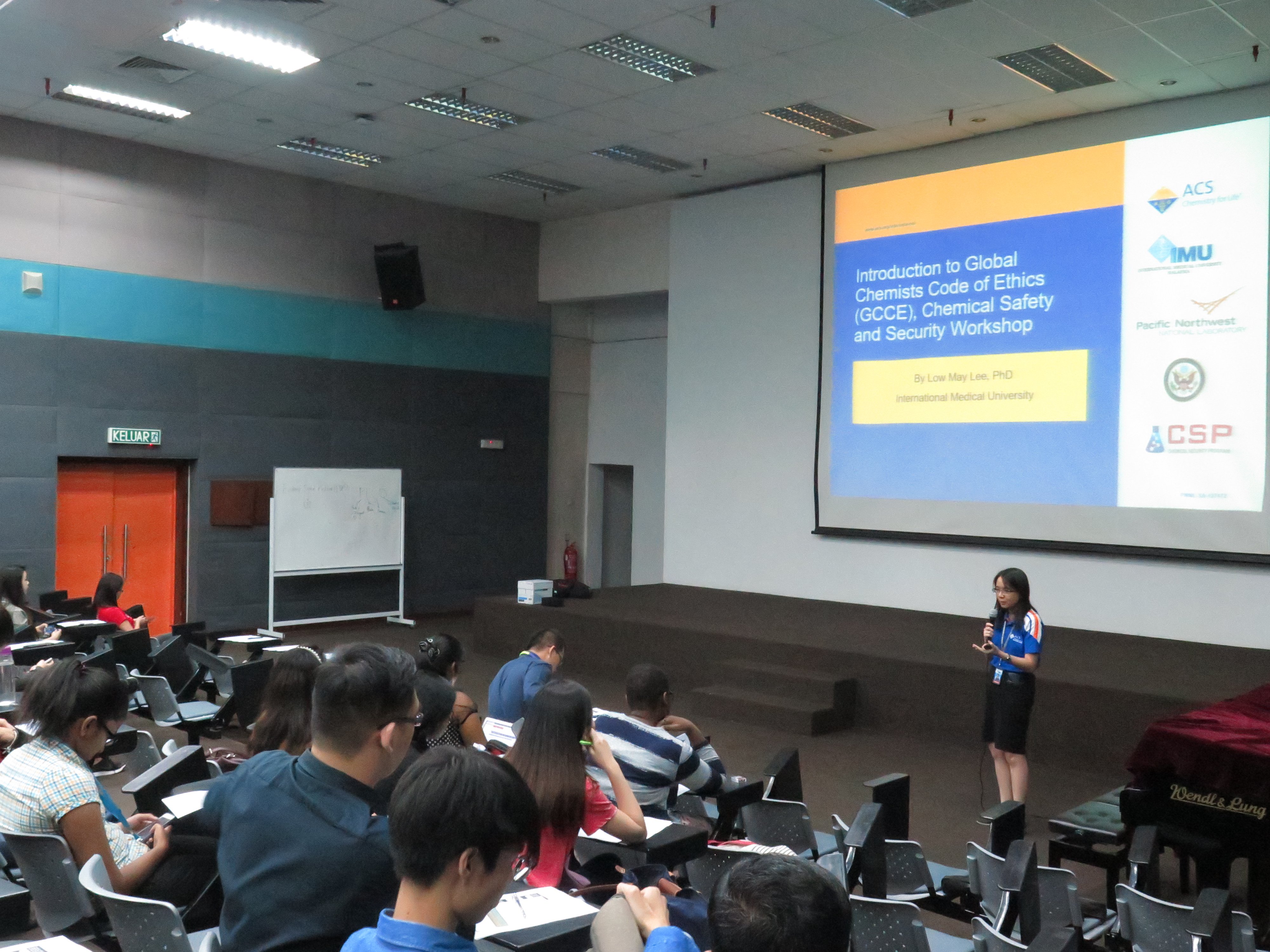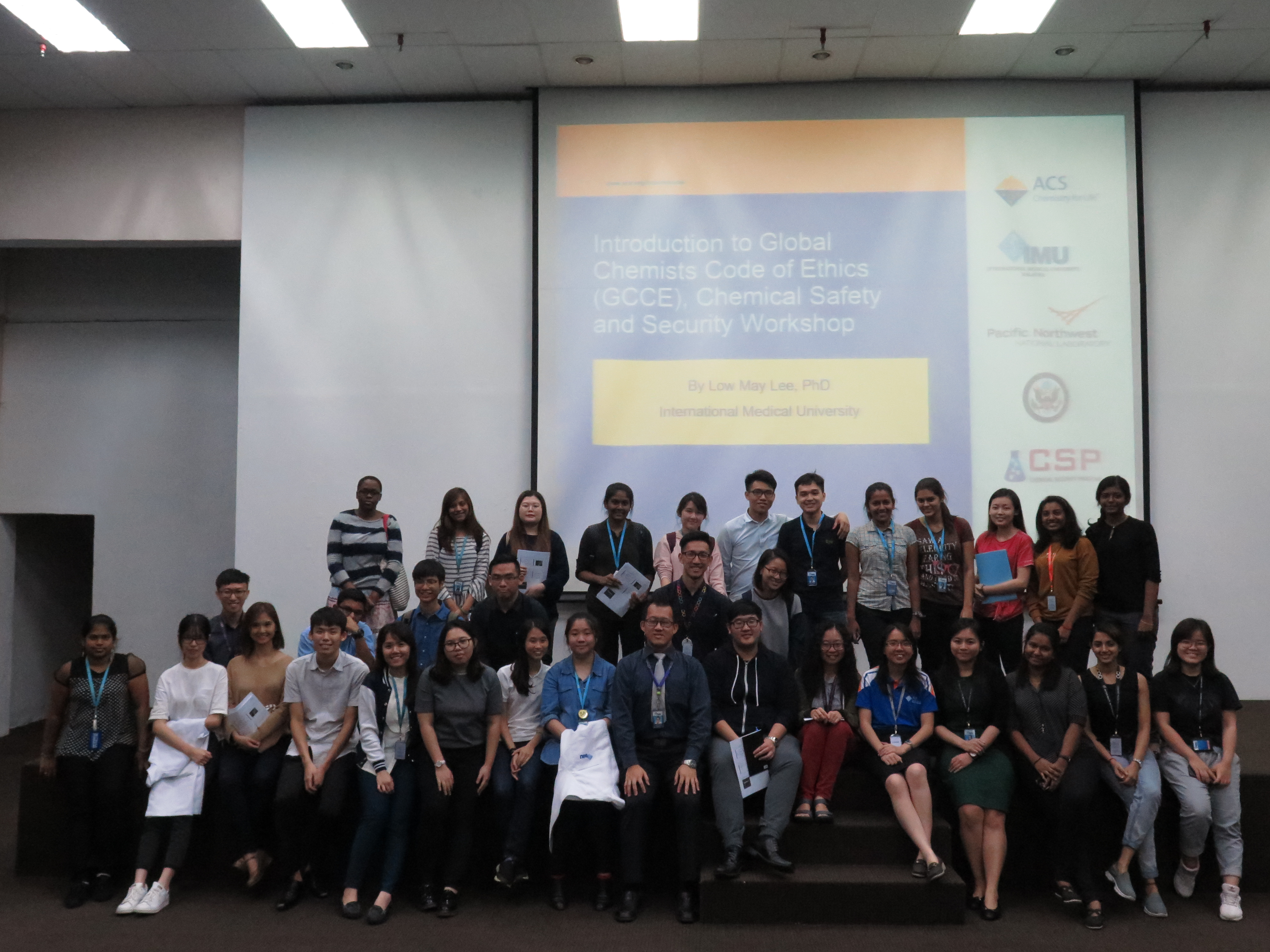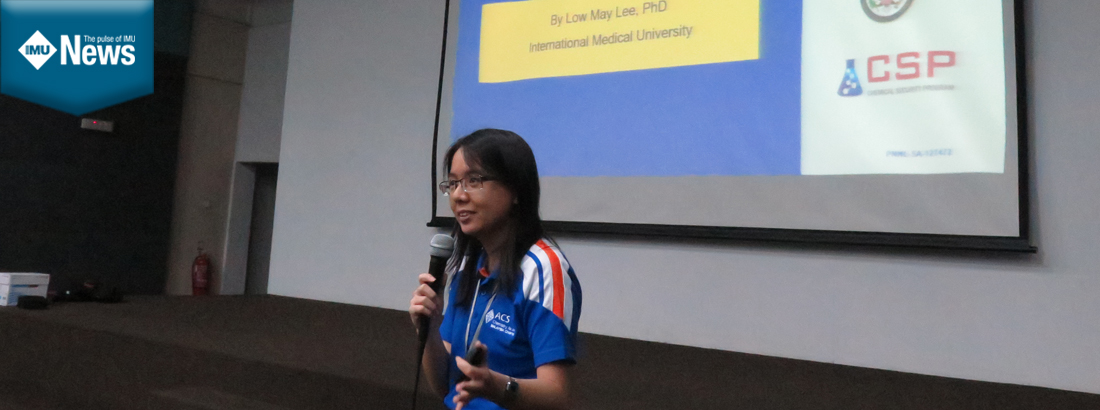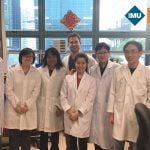8 November and 5 December 2017 – An Introduction to Global Chemists’ Code of Ethics (GCCE), Chemical Safety and Security workshop was jointly organised by the American Chemical Society (ACS) – the world’s largest scientific society and the Department of Pharmaceutical Chemistry, School of Pharmacy, International Medical University (IMU). The workshop was held at the University’s campus in Bukit Jalil on 8 November 2017 and 5 December 2017, respectively. The objectives were to convince the participants on the importance of applying GCCE, chemical safety and security in their respective programme/profession and to provide them with the practical knowledge to do so.
There were a total of 101 participants, comprising a mixture of undergraduate students, postgraduate students and academic staff. The workshop was made compulsory for all Bachelor of Science (Hons) Pharmaceutical Chemistry’s cohorts and optional for Bachelor of Pharmacy (Hons)’s students, postgraduate students and faculty members.
 The organising chair, Dr Low May Lee, an active member of ACS Malaysian Chapter was recently selected as one of four Malaysian representatives to attend the GCCE Science and Technology Leadership Institute (STLI) workshop organised by the US Department of State Chemical Security Program (CSP) in cooperation with ACS in Melbourne, Australia. She was also awarded a mini-grant of $300 USD to share the concepts of GCCE to students and staffs of IMU via this workshop. The workshop consists of a presentation by Dr Low, an interactive discussion on selected case studies and a Q&A session. The newly launched “Choose Your Own Adventure” based E-learning module developed by scientists at Pacific Northwest National Laboratory (PNNL) was also incorporated in the workshop. The topics covered in the presentation were:
The organising chair, Dr Low May Lee, an active member of ACS Malaysian Chapter was recently selected as one of four Malaysian representatives to attend the GCCE Science and Technology Leadership Institute (STLI) workshop organised by the US Department of State Chemical Security Program (CSP) in cooperation with ACS in Melbourne, Australia. She was also awarded a mini-grant of $300 USD to share the concepts of GCCE to students and staffs of IMU via this workshop. The workshop consists of a presentation by Dr Low, an interactive discussion on selected case studies and a Q&A session. The newly launched “Choose Your Own Adventure” based E-learning module developed by scientists at Pacific Northwest National Laboratory (PNNL) was also incorporated in the workshop. The topics covered in the presentation were:
| (1) Global Chemists’ Code of Ethics |
| Chemical research has made significant positive impact in the world around us. However, aspects of such beneficial discoveries can also be used for negative purposes, which have led to the use of the term “dual use” to describe such research. Due to this fact, scientists have two enduring challenges: become and remain aware of the dual use potential of their work, and become and remain responsible for the dual use research of concern that they themselves and their colleagues conduct. Guided by The Hague Ethical Guidelines and Code of Conduct Toolkit, the Global Chemists’ Code of Ethics (GCCE) encourages global chemistry enterprise to adopt internationally recognised practices for chemical safety and security as well as compliance with national arms control and non-proliferation commitments. In particular, the GCCE outlines a process by which scientists and their institutions can define, detect and discourage misconduct in their field and deter questionable research practices. |
| (2) Chemical Safety |
| A culture of safety is very important and should be sustained by management, including academic, industrial and government leadership. Management should work with chemical practitioners in all aspects of safety including training, regular audits and the development of safety culture. There should always be awareness of safety regulations protecting health and the environment. All chemicals practitioners should exercise safety procedures. Engineering and administrative controls for safety should be in place. Proper personal protective equipment and garments should be used when working with chemicals or in an area with hazards. |
| (3) Chemical Security |
| A culture of security is important to protect dual use chemicals and facilities. All stakeholders in the chemical supply chain should ensure and practice chemical security. Chemical practitioners should ensure that laboratories and industrial facilities have the capacity to secure chemicals. Security measures need to be reviewed regularly. Management should have oversight of security and should follow all local and international laws and regulations. |
 We received encouraging feedback from the participants that the objectives of this workshop were successfully achieved. There were suggestions to include other GCCE components such as publishing research and communicating science for future workshop(s) and also to incorporate the topics and case studies into Bachelor of Science (Hons) Pharmaceutical Chemistry’s Ethics and Laboratory Safety module.
We received encouraging feedback from the participants that the objectives of this workshop were successfully achieved. There were suggestions to include other GCCE components such as publishing research and communicating science for future workshop(s) and also to incorporate the topics and case studies into Bachelor of Science (Hons) Pharmaceutical Chemistry’s Ethics and Laboratory Safety module.









